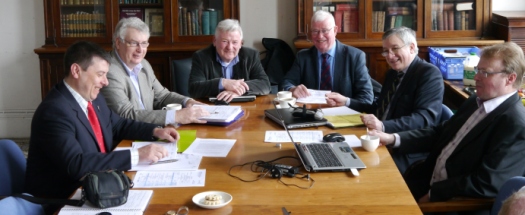News from the Pan European Reserves and Resources Reporting Committee (PERC)
 PERC was set up in 2006 in order to formalise a European Standard for reporting (as an update to the IMM Reporting Code of 1991 and "The Reporting Code" of 2001), equivalent to the Australian JORC, South African SAMREC and Canadian CIM NI43 101, and others from the USA, Chile and Russia in the international CRIRSCO (Committee for Mineral Reserves International Reporting Standards) family of reporting codes/standards.
PERC was set up in 2006 in order to formalise a European Standard for reporting (as an update to the IMM Reporting Code of 1991 and "The Reporting Code" of 2001), equivalent to the Australian JORC, South African SAMREC and Canadian CIM NI43 101, and others from the USA, Chile and Russia in the international CRIRSCO (Committee for Mineral Reserves International Reporting Standards) family of reporting codes/standards.
Image: PERC Committee: L-R: Carlos Almeida, Steve Henley, John Clifford, Gordon Riddler, Graham Woodrow and Markku Iljina.
It was founded by collaboration between the Geological Society of London (GSL), the Irish Geological Institute (IGI), the Institution of Materials, Minerals and Mining (IMMM) and the European Federation of Geologists (EFG) and replaced the defunct IMM Reserves Committee and an ad hoc European working group. The Committee has four members from each of the founding organisations, and at present eight co-opted members representing various other European national professional geological and mining organisations and industry sectors. The Chairman of the Committee is Eddie Bailey who is one of the GSL representatives.
The latest version of the PERC Standard was published on March 16th 2013 and is a principles-based standard providing Transparency, Materiality and Competence.
- Transparency - The reader of a Public Report must be provided with sufficient information , the presentation of which is clear and unambiguous, so that they can understand the report and not be misled
- Materiality – A Public Report must contain all the relevant information which investors and their professional advisers would require, and reasonably expect to find, for the purpose of making a reasoned and balanced judgement regarding the Exploration Results, Mineral Resources or Mineral reserves being reported;
- Competence – A Public Report must be based on work that is the responsibility of suitably qualified and experienced persons (Competent Persons) who are subject to an enforceable Code of Ethics and Rules of Conduct. For Geological Society Fellows, CGeol status plus at least 5 years’ relevant experience is the minimum requirement for a ‘Competent Person’.
The Committee met in Dublin on 29 March for its second AGM. Promotion of the PERC Standard, to make it the reference standard for European reporting, is the main aim. In particular we hope that the European Securities and markets Authority (ESMA) might be persuaded to specify PERC for reporting to European Stock Markets. This is particularly important as the UK Stock Exchange has over 40% of the world investment in resources and, together with the other European Exchanges, comprises well over 50% of the global total.
A training workshop entitled ‘Best Practice for the Assessment and Reporting of Exploration Results, Mineral Resources and Mineral Reserves’, was presented by Dr Edmund Sides (AMEC). PERC has plans to develop further training in good practice for geologists and others in the Mineral Exploration/Mining area.
CGeol in Hong Kong
We hear from Mr Sam Ng that CGeol has been adopted by the Civil Engineering and Development Department (CEDD) for Civil Service recruitment of Geologists, and that the Accredited Training Scheme has also been adopted by the Civil Service for training of Geologists.
This is the first time that CGeol’s effective equivalence to ‘MHKIE’ has been put in writing in an official government document. In practice, since the 1980s the Geotechnical Engineering Office (GEO) of CEDD has accepted CGeol, and MIGeol before it, as equivalent to MHKIE - but that was decided ad hoc by the GEO without there ever being official written acceptance.
The important step forward is that ‘Chartered Geologist’ is now the
de facto qualification for professional geologists in Hong Kong.